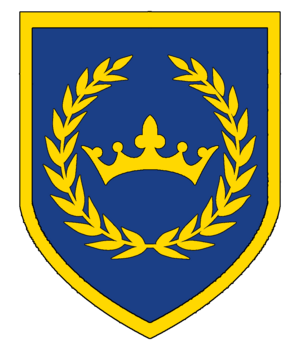Grand Army of the Realm
This article is incomplete because it is pending further input from participants, or it is a work-in-progress by one author. Please comment on this article's talk page to share your input, comments and questions. Note: To contribute to this article, you may need to seek help from the author(s) of this page. |
| Grand Army of the Realm | |
|---|---|
| Große Armee des Reiches | |
 Coat of Arms of Brumen | |
| Founded | 10 June 1305 |
| Current form | 29 January 1919 |
| Service branches | |
| Headquarters | GAR High Command, Anfang |
| Leadership | |
| Commander-in-Chief | Anne-Marie I |
| Chancellor | Immanuel Vogel |
| Chairman of GAR High Command | General Garrit Schröder |
| Personnel | |
| Military age | 19 |
| Conscription | 24 months national service |
| Active personnel | 180,000 |
| Reserve personnel | 450,000 |
| Expenditure | |
| Budget | $20.4 Billion |
| Percent of GDP | 2.87% |
| Industry | |
| Domestic suppliers | |
The Grand Army of the Realm (Brumenese: Große Armee des Reiches), commonly abbreviated as GAR is the unified armed forces of the Kingdom of Brumen and is comprised of the Land Forces, Royal Navy, Air Force, Coast Guard and State Guard. Brumen maintains a personnel strength of 630,000 (180,000 active and 450,000 reserves) and supported by 30,000 full time civilian staff for administration & support purposes as of 2020, a relatively small number of personnel compared to its continental neighbors. It is administered by the Department of Defense (Ministerium der Verteidigung) a civilian federal government body that administers and establishes the defense policies of the nation. Brumen currently has an active compulsory military service known as the National Service (Wehrdienst) policy where all able-bodied male citizens between the ages of 18-28 years old must serve in the armed forces between 18-22 months in the GAR. Upon completion conscripts are automatically placed on the reserve roster for a period of five years. Various exemptions from conscription applies for certain conditions such as but not limited to: medical conditions and physical disabilities. Conscientious Objectors for certain criterias are permitted to state their unwillingness to serve in the GAR and may perform alternate service in the national police force or the civil defense force.
